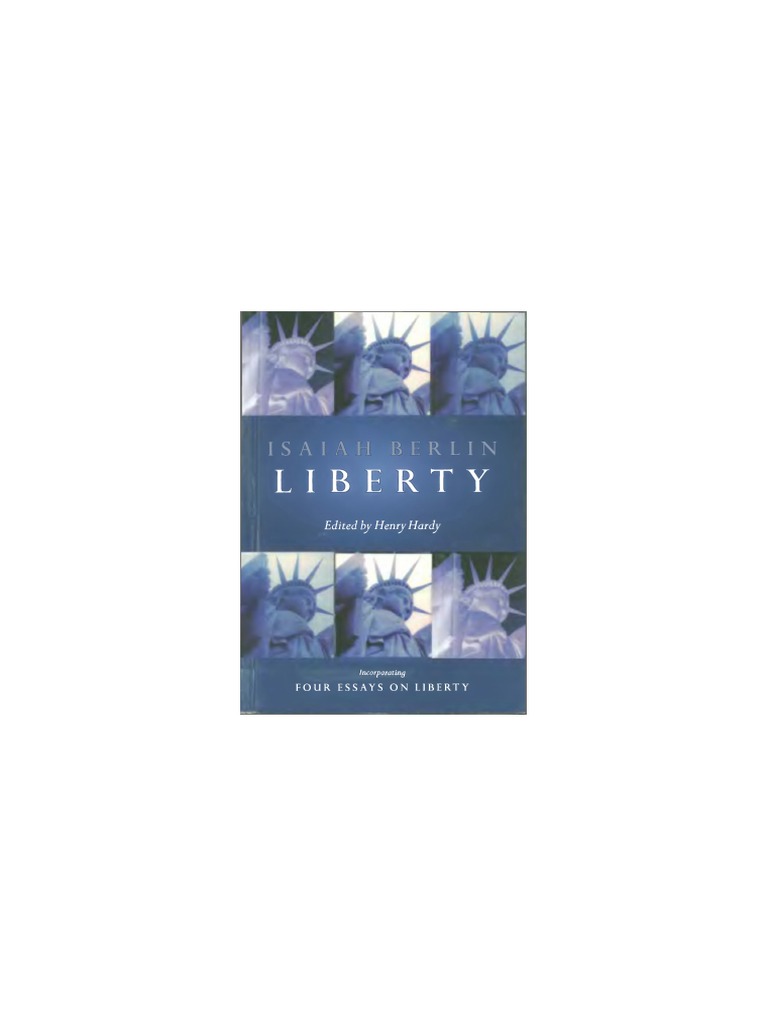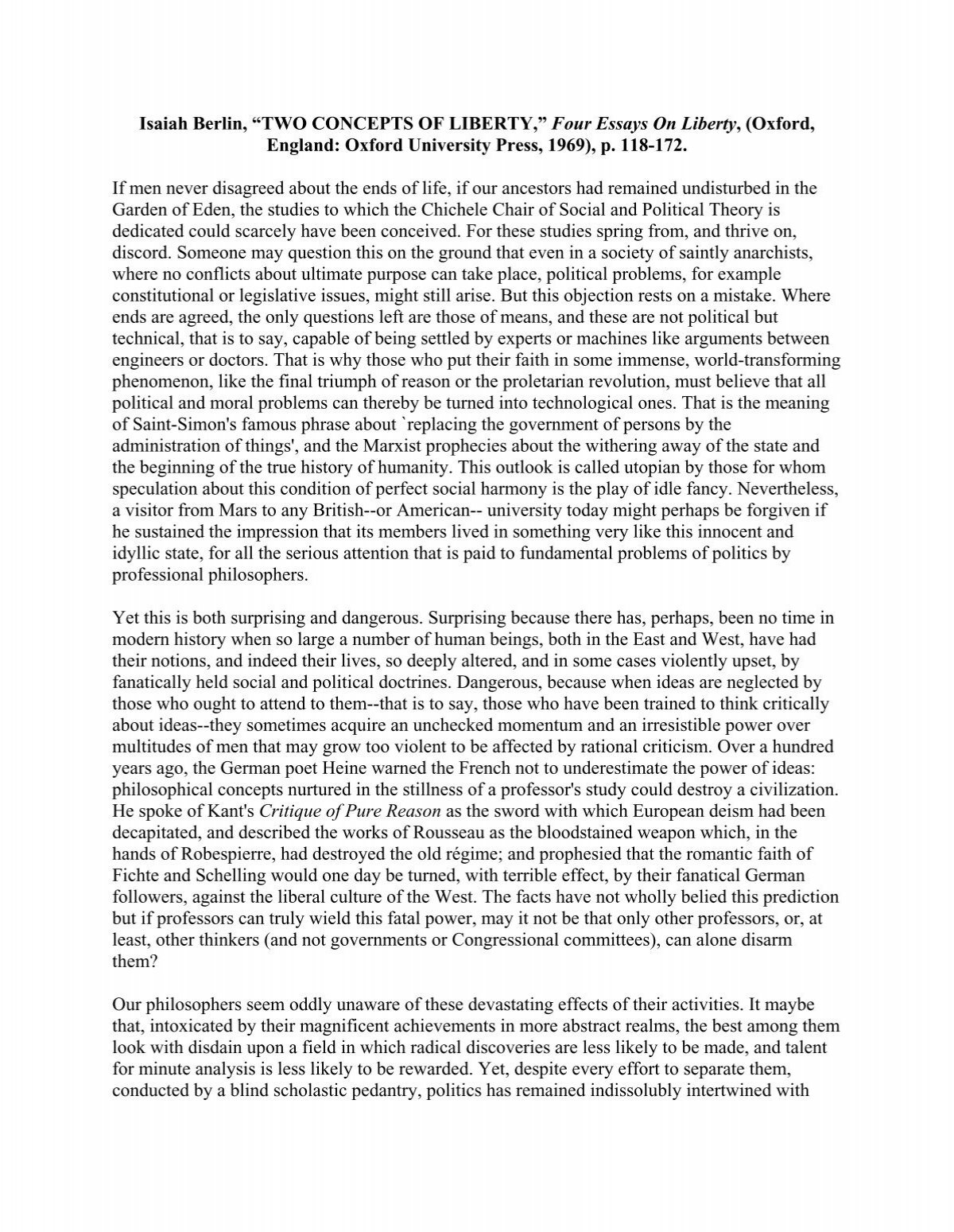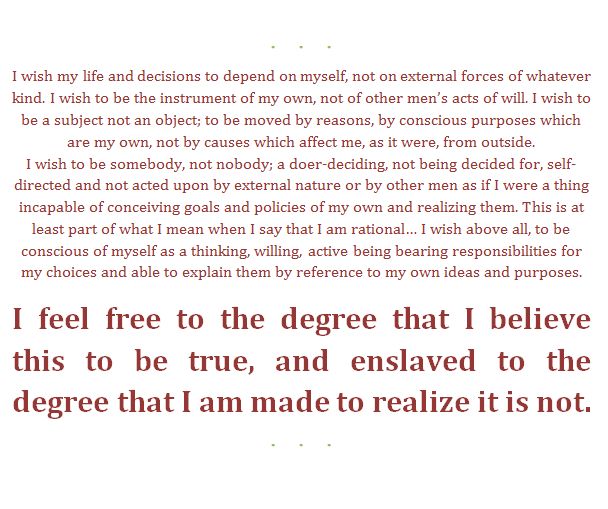Isaiah Berlin Two Concepts Of Liberty

Isaiah Berlin's essay "Two Concepts of Liberty," originally a lecture delivered in 1958, remains a cornerstone of liberal political thought. It profoundly shaped the debate about freedom and its relationship to power, politics, and the individual. This essay distinguishes between two distinct and often conflicting concepts of liberty: negative liberty and positive liberty. Understanding these concepts is crucial for navigating the complexities of modern political discourse and assessing the legitimacy of various forms of government intervention.
De Twee Concepten: Een Fundamenteel Onderscheid
Berlin's central argument revolves around the assertion that these two concepts of liberty, while both aiming to maximize human flourishing, can lead to vastly different and even opposing political outcomes. He doesn't simply present them as two equally valid options; rather, he expresses a deep concern about the potential for positive liberty to be misused and abused, leading to authoritarianism and oppression. He emphasizes the historical dangers associated with ideologies that prioritize collective goals over individual autonomy.
Negatieve Vrijheid: Vrijheid van Interferentie
Negatieve vrijheid, according to Berlin, is essentially freedom from interference. It answers the question: "How far am I controlled by others?" A person is negatively free to the extent that no individual or institution prevents them from doing what they might want to do. This concept emphasizes the absence of external constraints, coercion, or obstacles that limit an individual's actions.
This does not necessarily imply that individuals possess unlimited choices or capabilities. A person might be poor and unable to afford travel, but that doesn't mean their negative liberty has been violated. It simply indicates a lack of resources, not a deliberate obstruction imposed by others. The focus is on the *absence of external impediments* to their actions, regardless of their underlying capabilities.
Think of it like this: the rule of law, while imposing some limitations on behavior, ultimately protects negative liberty by preventing arbitrary interference from others. A system of property rights, for instance, ensures that individuals can use their possessions without fear of theft or confiscation, thus enhancing their negative freedom.
Positieve Vrijheid: Vrijheid tot Zelf-Meesterschap
Positieve vrijheid, in contrast, is freedom to be one's own master. It addresses the question: "Who is master?" Berlin argues that this concept centers on the individual's capacity for rational self-determination and the ability to act according to one's own will, rather than being driven by irrational desires, external forces, or societal pressures. It is the desire of the individual to be his own instrument.
The core idea is that true freedom involves not just the absence of external constraints but also the presence of internal capacities: reason, self-control, and the ability to pursue one's goals effectively. This can lead to the idea that the state should actively intervene to cultivate these capacities, perhaps through education, social welfare programs, or even restrictions on certain behaviors deemed irrational or harmful.
The danger arises, according to Berlin, when the concept of positive liberty is twisted. The "true" self may be identified with a collective entity like the state, the nation, or a particular social class. In this case, individuals are seen as truly free only when they conform to the will of the collective, even if it means suppressing their own desires and dissenting opinions. This is where positive liberty can become a justification for authoritarianism.
De Gevaren van Positieve Vrijheid
Berlin's most significant concern lies in the potential for positive liberty to be perverted into a justification for totalitarianism. He argues that the pursuit of positive liberty, when divorced from individual autonomy and respect for dissenting views, can easily lead to the suppression of individual freedoms in the name of a higher collective good.
The justification often runs like this: "These people are not truly free because they are enslaved by their ignorance, their passions, or their false consciousness. Therefore, we, the enlightened vanguard, are justified in forcing them to be free." This argument, Berlin contends, has been used to justify all sorts of oppressive regimes throughout history.
The French Revolution, with its emphasis on "forcing people to be free," serves as a potent example. While initially driven by noble ideals of equality and fraternity, it quickly descended into terror and dictatorship, fueled by the belief that the revolutionary state embodied the "general will" and had the right to suppress all dissent in the name of achieving true freedom. Other examples can be found in 20th-century communist regimes, where individual freedoms were sacrificed in the name of achieving a utopian socialist society.
Real-World Voorbeelden en Toepassingen
The tension between negative and positive liberty can be seen in numerous contemporary political debates. For example, discussions about mandatory vaccination often highlight this conflict. Proponents of mandates argue that they promote positive liberty by ensuring public health and preventing the spread of disease, thereby enabling individuals to live healthier and more fulfilling lives. Opponents, on the other hand, emphasize negative liberty, arguing that individuals should have the freedom to choose whether or not to be vaccinated, even if that choice carries risks to themselves and others.
Another example can be found in debates about economic inequality. Proponents of wealth redistribution often argue that extreme inequality limits positive liberty for the poor, preventing them from accessing opportunities and realizing their full potential. They advocate for policies like progressive taxation and social welfare programs to level the playing field and empower disadvantaged individuals. Critics, however, may argue that such policies infringe on the negative liberty of the wealthy, who have a right to enjoy the fruits of their labor without undue interference from the state.
Data on political freedom and economic development also shed light on the complex relationship between different forms of liberty. Countries with strong protections for negative liberty, such as freedom of speech and assembly, tend to have higher levels of economic prosperity and innovation. However, these countries may also struggle with issues like income inequality and social fragmentation. Conversely, countries that prioritize positive liberty through extensive social welfare programs may achieve greater social equality but risk stifling economic growth and individual initiative.
Conclusie: Een Noodzaak tot Evenwicht
Isaiah Berlin's "Two Concepts of Liberty" offers a vital framework for understanding the complexities of freedom in the modern world. It cautions against the dangers of prioritizing positive liberty at the expense of negative liberty, highlighting the historical risks of authoritarianism and the suppression of individual rights in the name of a higher collective good.
While acknowledging the importance of both concepts, Berlin ultimately favors a system that prioritizes negative liberty as the foundation for a free and just society. He argues that the absence of coercion and the protection of individual rights are essential for fostering a pluralistic society where individuals can pursue their own goals and live according to their own values, without undue interference from the state or other individuals.
However, this doesn't mean ignoring the needs of those lacking the means to fully exercise their negative liberties. A functioning society requires a balance. The challenge lies in finding ways to promote positive liberty – to empower individuals and cultivate their capacities – without sacrificing the fundamental protections of negative liberty. This requires a constant vigilance against the seductive allure of utopian ideals and a commitment to safeguarding the rights and freedoms of all individuals, regardless of their beliefs or circumstances. The true test of a free society is its ability to protect the rights of the minority, even when those rights are unpopular or inconvenient. We must remain aware of the potential pitfalls of both concepts and strive for a balance that fosters both individual autonomy and collective well-being. Consider carefully the implications of policies and actions that impact liberty, and advocate for solutions that promote both freedom *from* and freedom *to* in a way that respects the dignity and autonomy of every individual.


Bekijk ook deze gerelateerde berichten:
- Wanneer Is Dia De Los Muertos
- Notre Dame De Paris Victor Hugo
- Nederlandse Schrijver Van Bruiloft Aan Zee
- Edi-model Ik Wij Jullie Jij
- Waar Je Welsh Voetbalelftal - Pools Voetbalelftal Kunt Kijken
- Flikken Maastricht Seizoen 18 Aflevering 1
- Waar Ligt Venetië Op De Kaart
- Waar Zit Veel Vit K In
- Oorzaak Vocht In De Longen
- Hoe Kan Je Nepnieuws Herkennen
